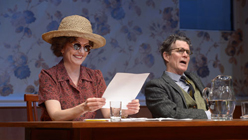Dear Elizabeth at Berkeley Repertory Theatre seems like a tough sell and an easy one at the same time. It’s a play based on the letters between poets Elizabeth Bishop and Robert Lowell, so it’s sure to be of interest to American poetry buffs. It’s the latest collaboration between playwright Sarah Ruhl and director Les Waters, which should attract the Berkeley Rep faithful no matter what the subject. Ruhl has been dazzling the theater’s audiences since her luminous upturning of the Orpheus myth, Eurydice, in 2004, returning with her new translation of Anton Chekhov’s Three Sisters and the world premiere of her Victorian period piece In the Next Room (or the vibrator play), which went on to New York in Ruhl and Waters’s Broadway debut. Then the Rep’s associate artistic director, Waters proved to be her perfect artistic partner, and their collaboration has continued now that he’s artistic director of the revered Actors Theatre of Louisville. This is the West Coast premiere of Dear Elizabeth, which debuted at Yale Repertory Theatre in late 2012.
If you’re not already a Ruhl/Waters fan or a Bishop/Lowell one, here’s the pitch: With its text drawn from the letters between the two poets, it traces the length and depth of their friendship as an intellectual love story between the formidable minds of a man and woman who were never lovers (not least because Bishop was a lesbian) but fierce friends and confidantes, writing each other prolifically as they were seldom in the same place. Their correspondence takes them through breakdowns and drinking binges, triumph and tragedy, and always their shared passion for the craft of poetry. “When does one begin to write the real poems?” Bishop says in frustration in middle age.

The format is largely the same as A.R. Gurney’s ubiquitous play Love Letters, which traces the lifetime correspondence of two would-be lovers from childhood to death. The two actors sit side-by-side at a long table as one recites the letter that the other is reading. But Ruhl and Waters mix things up by having the correspondents move around a lot, with wordless interludes acting out some of the few times the poets actually met in person. From time to time one of them will suddenly go limp and collapse to the floor, indicating a breakdown. Mary Beth Fisher has a winning wryness as Bishop that makes it easy to believe in the poet’s formidable intellect. Tom Nelis’s Lowell is more manic, a man of intense and shifting passions who will suddenly start staring off into space as his hand counts off the meter of lines in his head.

Annie Smart’s set is surprisingly humdrum — an oversize, mostly empty room that looks like it could be in a recreation center or something (definitely not in a house), with unattractive floral wallpaper. A couple of bookshelves are placed on opposite sides of the stage to symbolize the separate lives of the correspondents. The plainness of the room is somewhat deceptive, as it makes room for special effects along the way, some breathtaking and others oddly corny.



